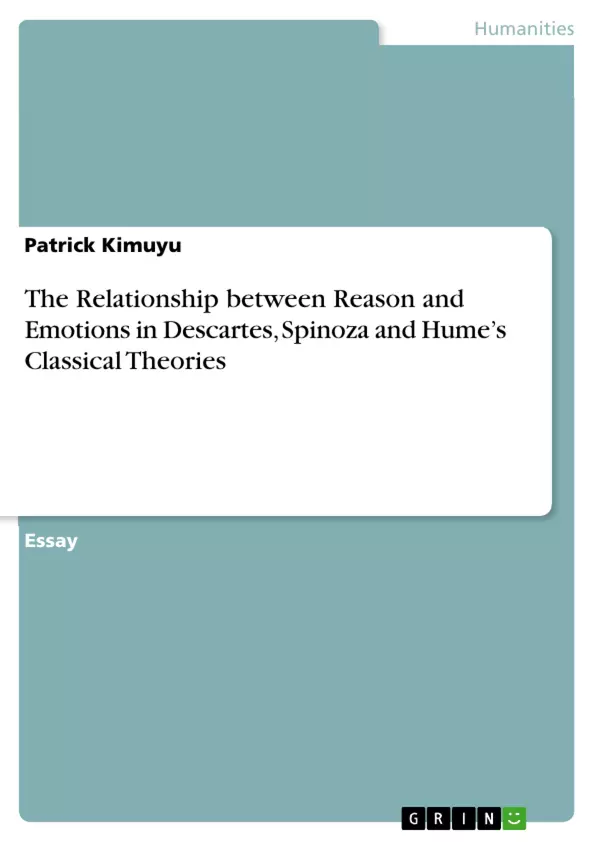In philosophical and psychological fields, emotion is referred to as subjective and conscious experience that is primarily characterized by psycho-physiological expressions, mental states and biological reactions. It is mostly associated and deemed jointly influential with mood, personality, temperament, motivation and disposition. Over the years, emotion theory has, therefore, been illustrated by a dichotomy involving the body and head. In the 1960s and 1970s (cognitivism golden years), this theory focused on cognitive emotion antecedents, the so-termed as appraisal processes, with some philosophers perceiving bodily events as by-products of cognition, and as highly unspecific to contribute to emotion experience variety. In other words, they conceptualized cognition as an abstract and intellectual process that is detached from bodily events. Cognitivism legacy perseveres in treating bodily and cognitive events as separate emotion components, even though the present emotion theory has moved past this disembodied position by conceiving of emotions as comprising the two processes; cognitive processes like perception and attention, and bodily event such as behavior and arousal. However, it is evident that the body already highly contributed to the theories of emotion of Descartes, Spinoza and Hume since their arguments never implied that they denied other emotion aspects like cognition and evaluation. Rather, these three classical theorists considered emotions as psychosomatic states, each focusing on distinct emotion aspects as per their theories, but showing an intimate connection between the body and emotions that leads to a relationship between reason and emotions.
Therefore, the purpose of this essay is to demonstrate the relation between reason and emotions by presenting the views of classical (pre-Jamesian) theories of Descartes, Spinoza and Hume.
Inhaltsverzeichnis (Table of Contents)
- Emotion and Reason
- Descartes' Theory of Passions
- Spinoza's Theory of Emotion
- Hume's Theory of Passions
- The Role of Cognition in Emotion
- Conclusion
Zielsetzung und Themenschwerpunkte (Objectives and Key Themes)
This essay aims to explore the relationship between reason and emotion by examining the views of classical (pre-Jamesian) emotion theorists, specifically Descartes, Spinoza, and Hume. It delves into the psychosomatic nature of emotions, highlighting the interplay of bodily and cognitive elements in shaping emotional experiences.
- The Psychosomatic Nature of Emotions
- The Role of Cognition in Emotion
- The Relationship between Reason and Emotion
- The Influence of Classical Theories on Modern Emotion Research
- The Interplay of Body and Mind in Emotional Experiences
Zusammenfassung der Kapitel (Chapter Summaries)
- Emotion and Reason: This chapter introduces the concept of emotion as a subjective and conscious experience characterized by psycho-physiological expressions, mental states, and biological reactions. It highlights the historical dichotomy between body and mind in emotion theory, emphasizing the shift from cognitivism to a more embodied understanding of emotions.
- Descartes' Theory of Passions: This chapter explores Descartes' view on passions, emphasizing their psychosomatic nature and the role of the pineal gland in mediating the interaction between body and mind. It examines Descartes' definitions of emotions and how they relate to reason and cognition, underscoring the crucial link between mental and bodily events.
- Spinoza's Theory of Emotion: This chapter delves into Spinoza's theory of emotion, highlighting his rejection of Descartes' dualistic metaphysics and his concept of emotions as modifications of both bodily and mental attributes. It discusses Spinoza's view on the interconnectedness of mind and body and how emotions can be changed through the influence of other emotions.
- Hume's Theory of Passions: This chapter examines Hume's theory of passions, focusing on his distinction between direct and indirect emotions. It explores Hume's view on the role of ideas in shaping emotional experiences and his contention that reason is the slave of the passions. It highlights the importance of passions in guiding reason and shaping human values.
- The Role of Cognition in Emotion: This chapter discusses the debate surrounding the role of cognition in emotion, examining the criticism of classical theories as mere "feeling theories." It explores the contemporary view that emotions are intertwined with meaningfulness and world-relatedness, challenging the notion of cognition as an abstract and disembodied process.
Schlüsselwörter (Keywords)
This essay focuses on key terms and concepts related to emotion, reason, and the body-mind relationship. It examines classical theories of emotion, including Descartes' theory of passions, Spinoza's theory of emotion, and Hume's theory of passions. It explores the interplay of bodily and cognitive elements in shaping emotional experiences and the influence of these classical theories on modern emotion research.
Frequently Asked Questions
How did Descartes view the relationship between body and emotions?
Descartes viewed passions as psychosomatic states, emphasizing the role of the pineal gland in mediating the interaction between the mind and bodily events.
What was Spinoza's unique perspective on emotions?
Spinoza rejected dualism, seeing emotions as modifications of both bodily and mental attributes, highlighting the deep interconnectedness of mind and body.
What did Hume mean by "reason is the slave of the passions"?
Hume argued that reason alone cannot motivate action; instead, it is guided and driven by our emotional desires and passions.
Is there a role for cognition in these classical emotion theories?
Yes, despite being labeled "feeling theories," Descartes, Spinoza, and Hume all acknowledged the role of ideas, perceptions, and evaluations in emotional experiences.
How do these 17th and 18th-century theories relate to modern psychology?
These theories laid the groundwork for modern embodied cognition, which views emotions as a complex interplay of cognitive processes and physiological arousal.
- Citation du texte
- Patrick Kimuyu (Auteur), 2018, The Relationship between Reason and Emotions in Descartes, Spinoza and Hume’s Classical Theories, Munich, GRIN Verlag, https://www.grin.com/document/430704



